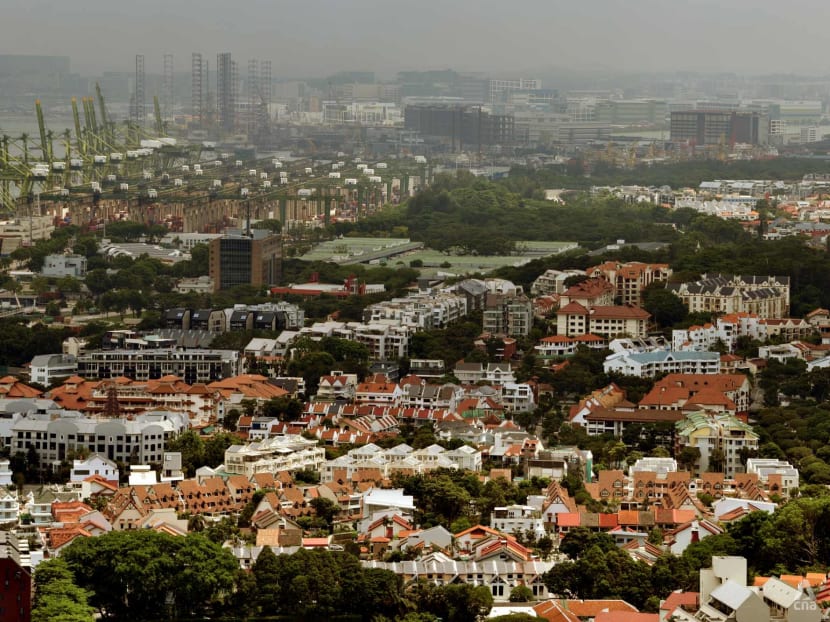Singapore property stocks decline after announcement of new market cooling measures

File photo of private homes in Singapore. (Photo: CNA/Jeremy Long)
SINGAPORE: Shares of Singapore’s property firms fell on Thursday (Dec 16) after the Government unexpectedly announced a slew of new measures to cool the private residential and HDB resale markets.
City Developments plunged as much as 4.1 per cent in early morning trade. The counter later regained some ground to close 2.7 per cent, or S$0.19 lower, at S$6.88.
Other developers also managed to trim their losses in afternoon trade. UOL finished 0.8 per cent, or S$0.06, lower at S$7.04, after declining as much as 3 per cent when the market opened. Oxley Holdings fell as low as S$0.179 at the open before recouping some losses to close down 2.1 per cent at S$0.183.
GuocoLand dropped 0.7 per cent, or S$0.01, to S$1.51, while Frasers Property shed 0.9 per cent, or S$0.01, to close at S$1.14.
Property agency PropNex closed 3.9 per cent, or S$0.07, lower at S$1.71 after having plummeted as much as 14 per cent earlier in the trading day.
Real estate brokerage APAC Realty also finished in the red, down 10.5 per cent or S$0.08 at S$0.685.
As part of the latest cooling measures announced late Wednesday night, the Additional Buyer's Stamp Duty (ABSD) rates for those buying additional properties will be raised.
From Thursday, Singapore citizens and permanent residents buying their second or subsequent homes will face a 5 to 15 percentage point increase in ABSD. Foreigners and entities will also incur more ABSD when purchasing any residential property.
The total debt servicing ratio (TDSR) threshold for borrowers will also be tightened from 60 per cent to 55 per cent. This will apply to property puchase loans where the option to purchase is granted on or after Dec 16, and for mortgage equity withdrawal loan applications made on or after Dec 16.
In addition, the Loan-to-Value (LTV) limits for loans from HDB will be lowered from 90 per cent to 85 per cent. This will affect new flat applications for sales exercises launched after Dec 16 and complete resale applications received by HDB from Dec 16 onwards.
The private residential and public housing resale markets have been buoyant, despite the economic impact of COVID-19, the Government said.
“If left unchecked, prices could run ahead of economic fundamentals, and raise the risk of a destabilising correction later on. Borrowers would also be vulnerable to a possible rise in interest rates in the coming years,” added the joint statement by the Finance Ministry, the Ministry of National Development and the central bank.
CGS-CIMB analyst Lock Mun Yee said the moves are targeted at “cooling investment”, rather than owner-occupier demand, as well as dampen market sentiment and volume demand in the near term.
Echoing that, OrangeTee & Tie senior vice-president of research and analytics Christine Sun expects some “knee-jerk reaction”, with sales volumes slowing down for about six months.
Private home prices may stabilise and rise at a much slower pace next year, she added. Given that, OrangeTee & Tie now expects prices for the private residential market to rise 0 to 3 per cent next year, down from an earlier forecast of 6 to 9 per cent.
Commenting on specific policy adjustments, Ms Lock noted that the rise in ABSD rates for entities, alongside the ramp-up in private and public housing supply, may impact the en-bloc market more adversely.
Impact from the tightening of the TDSR threshold and LTV for HDB purchases could be limited. On the latter, the additional down-payment that home-owners will have to fork out can be funded via cash or CPF, she added.
SECTOR TO RECOVER AFTER INITIAL KNEE-JERK REACTION
Ms Carmen Lee, head of OCBC Investment Research, noted that the latest announcement directly impacts two types of property stocks – the developers and the property agencies.
So far, the initial impact on property developers has been more measured while the real estate agencies have taken on a bigger hit given how their share prices have clocked significant gains this year.
“It is our view that the sales and transactional nature of the agencies’ operations are perceived to be affected more directly by the cooling measures, as opposed to the developers who are ‘shielded’ to a certain extent by diversified portfolios of assets,” she added.
Ms Lock said the news is expected to have a negative knee-jerk reaction on property stocks in general and impact sentiment in the near term.
But with developers already trading at a steep discount, partly due to expectations of potential cooling measures, the “removal of this overhang” and improved inventory situation due to more private and public housing supply may underpin share price performance in the medium term, she said in a note.
Similarly, RHB analyst Vijay Natarajan said he does not expect a persistent downtrend in property stock prices following the initial knee-jerk sell-off.
“We believe the market has been anticipating this for some time and pricing it in, although the measures in our view are slightly more harsher than anticipated,” he told CNA.
Given supporting factors such as low inventory levels, strong household balance sheets and improving job market conditions, the property market is likely to find an equilibrium, assuming economic conditions do not deteriorate, added Mr Natarajan.
Ms Lee also said it is likely that the latest cooling measures will not have been a great shock to the Singapore market, given how investors and property buyers are already familiar with the additional duties and taxes.
“Unless buyers are purchasing more than one property for investment, they remain relatively unaffected,” she added.
“Overall, we assess that the latest measures are fundamentally meant to ensure that there continues to be enough supply of affordable homes for citizens or PRs who truly need a first home, and that they have enough funds to purchase it.”
Elsewhere in the stock market, Singapore banks have shrugged off the new cooling measures despite their exposure to the home loan market.
DBS shares climbed steadily through the day to finish 1.4 per cent, or S$0.43, higher at S$32.33. UOB rose 1.3 per cent, or S$0.35, to S$27.03, while OCBC Bank gained 0.8 per cent, or S$0.09, to close at S$11.38.
“While housing loans may take up a sizeable portion of the bank businesses, the ongoing situation of demand outpacing supply may aid to cushion the impact on overall loan demand, potentially drawing some first-time homebuyers back over the longer term,” explained IG’s market strategist Yeap Jun Rong.
Coupled with improving economic conditions and the general shift towards policy normalisation, the potential of eventual interest rate hikes also bodes well for lenders’ overall net interest margins, he added.
The broader Straits Times Index finished 0.5 per cent higher at 3,128.80 by the end of Thursday.
BRINGING PRICES IN LINE WITH ECONOMIC FUNDAMENTALS
The last time property cooling measures were introduced in Singapore was in July 2018. Then, the Government similarly raised raised ABSD rates and tightened LTV limits.
The latest round of measures are implemented to cut the risk of a "self-reinforcing cycle" of price increases, said National Development Minister Desmond Lee on Thursday.
Authorities also pledged to increase the supply of both public and private housing to meet demand.
The Housing and Development Board (HDB) said on Thursday morning that it plans to launch up to 23,000 new Build-To-Order (BTO) flats each year over the next two years, in a bid to ramp up supply to meet “strong” housing demand from Singaporeans.
It will also increase the supply of private housing through the Government Land Sales (GLS) programme.









